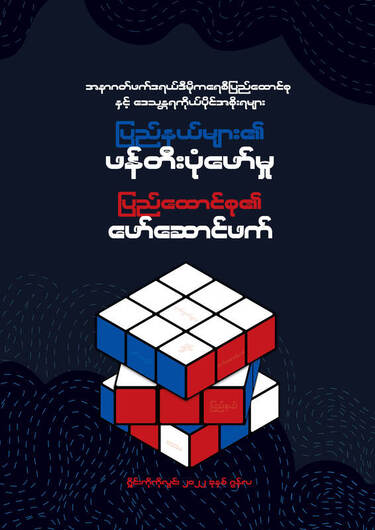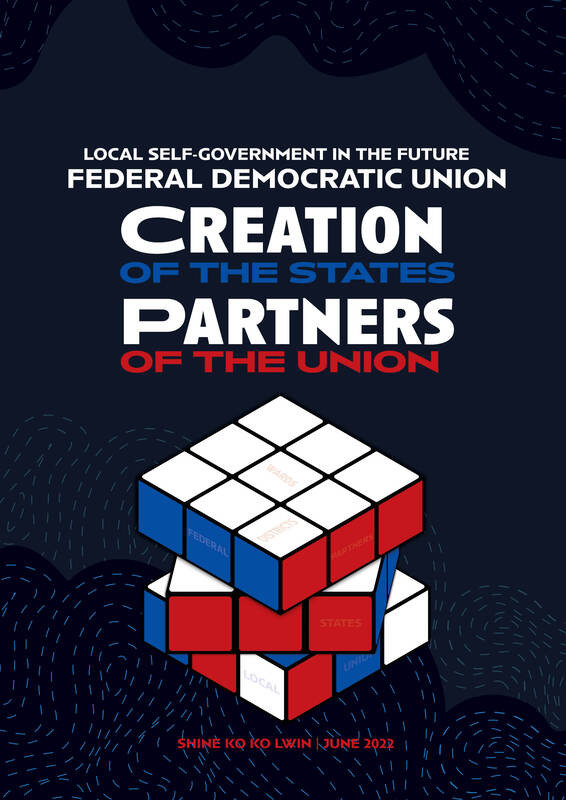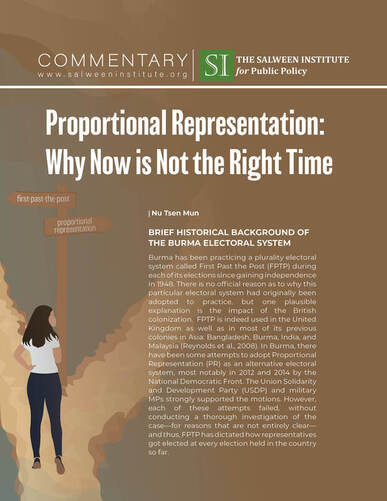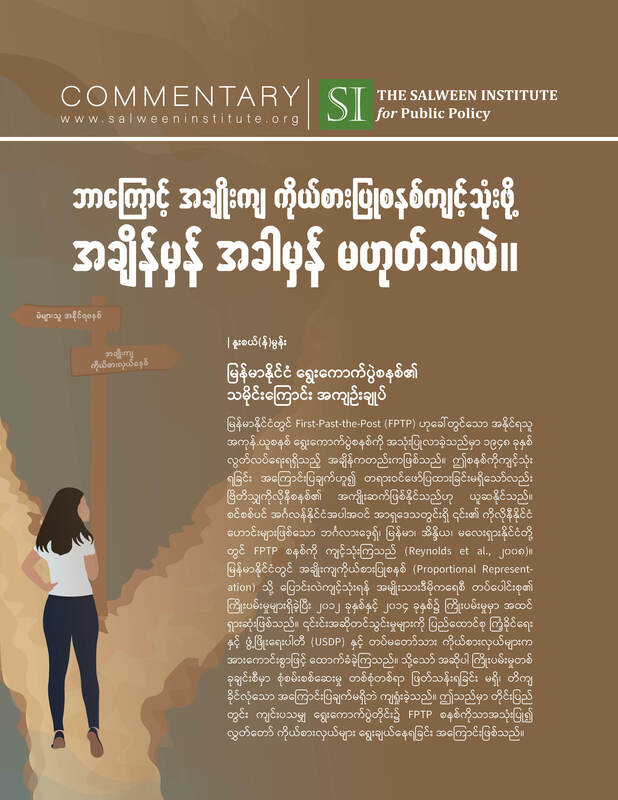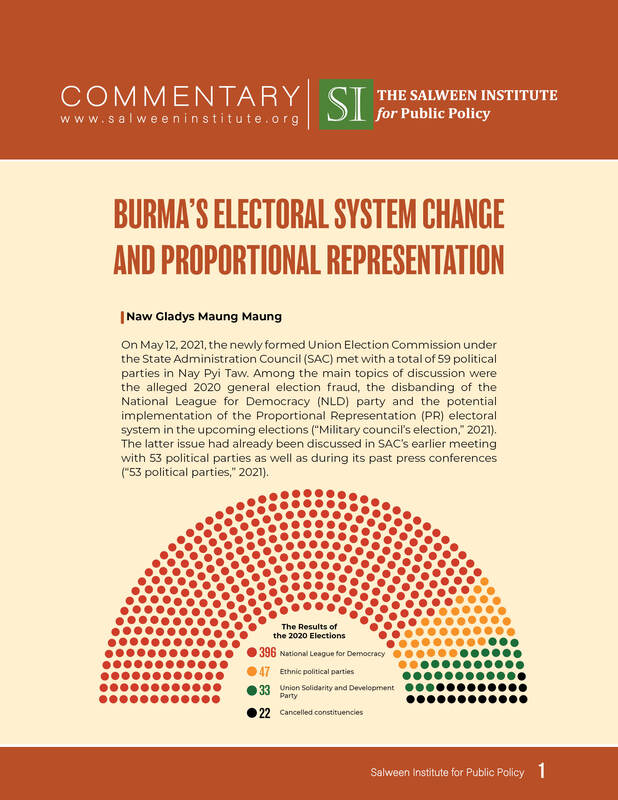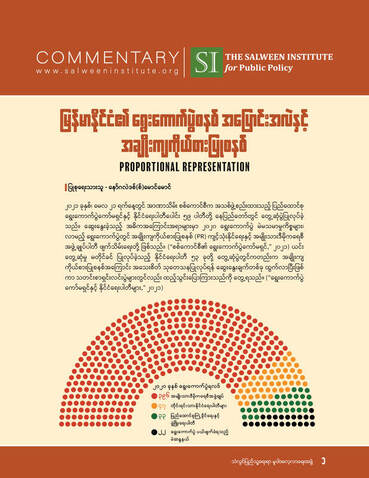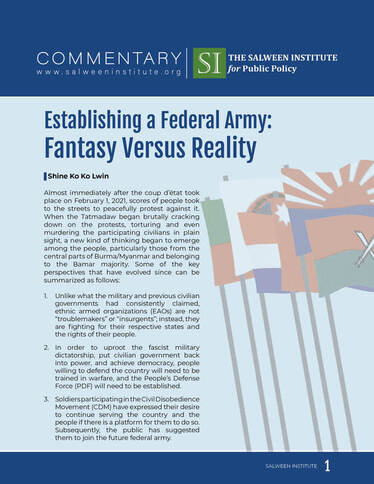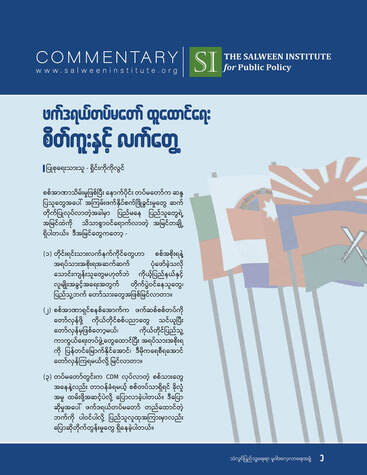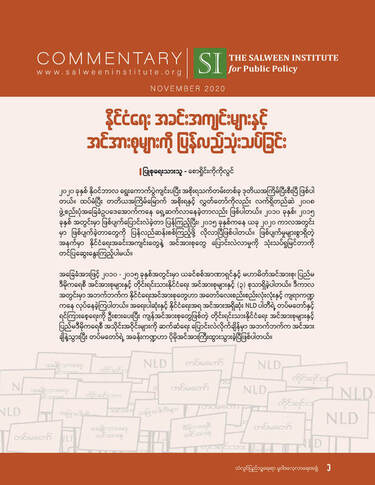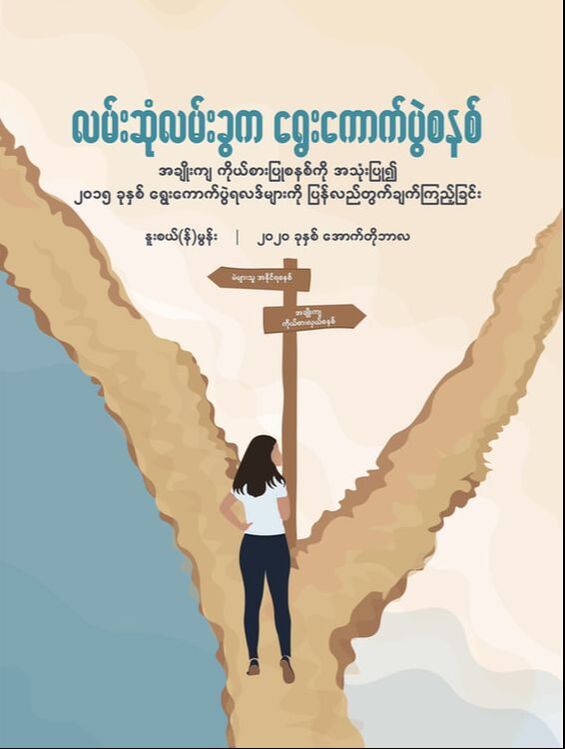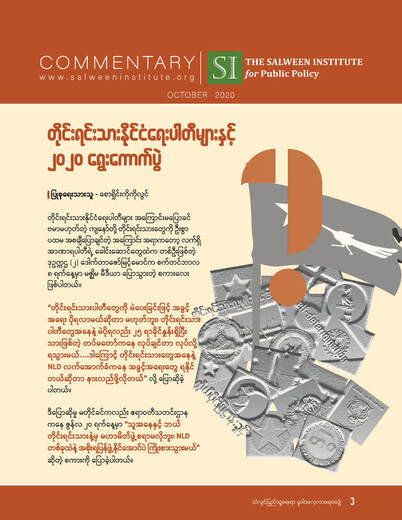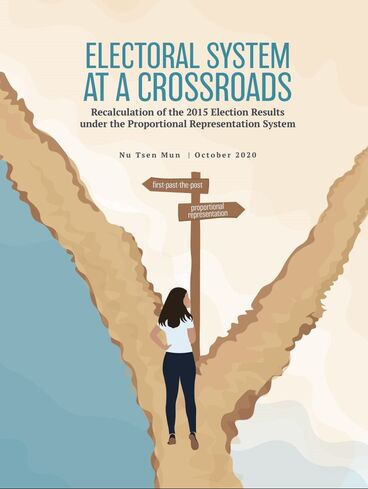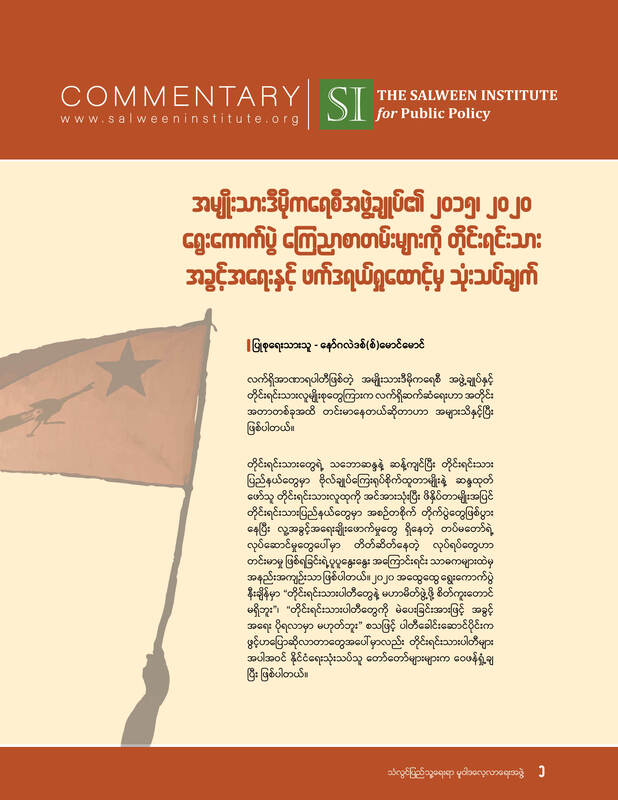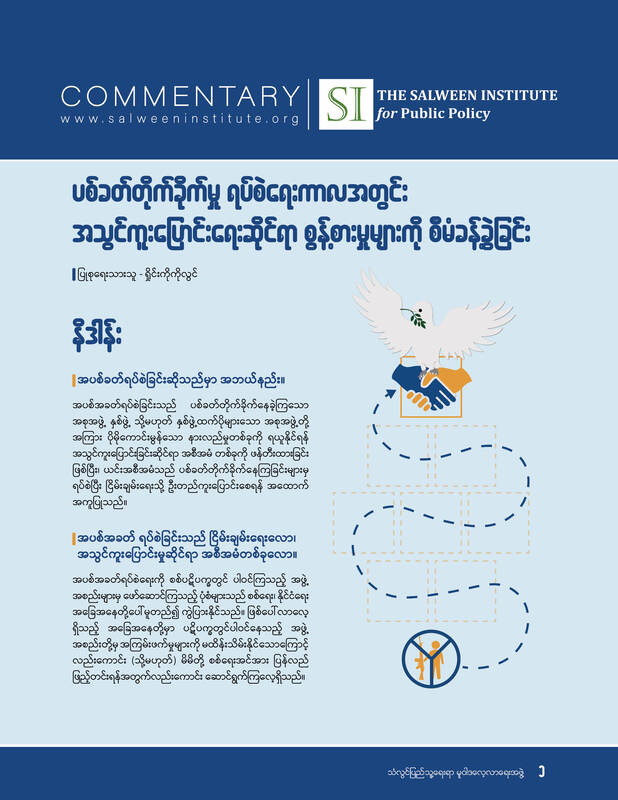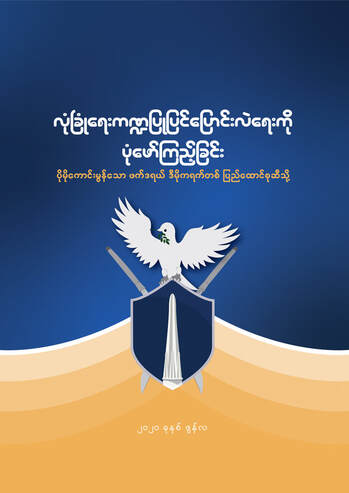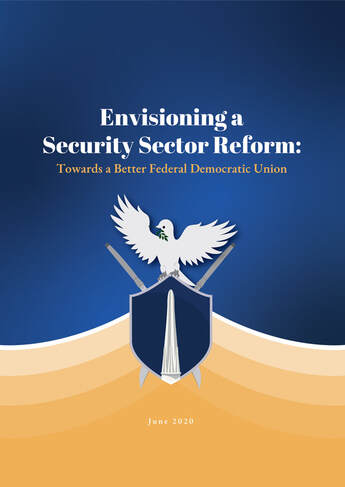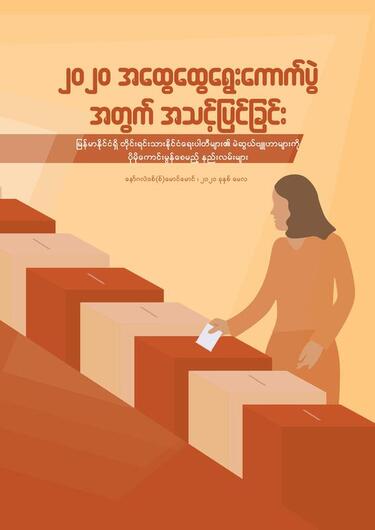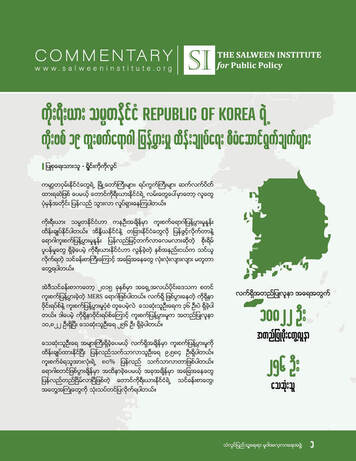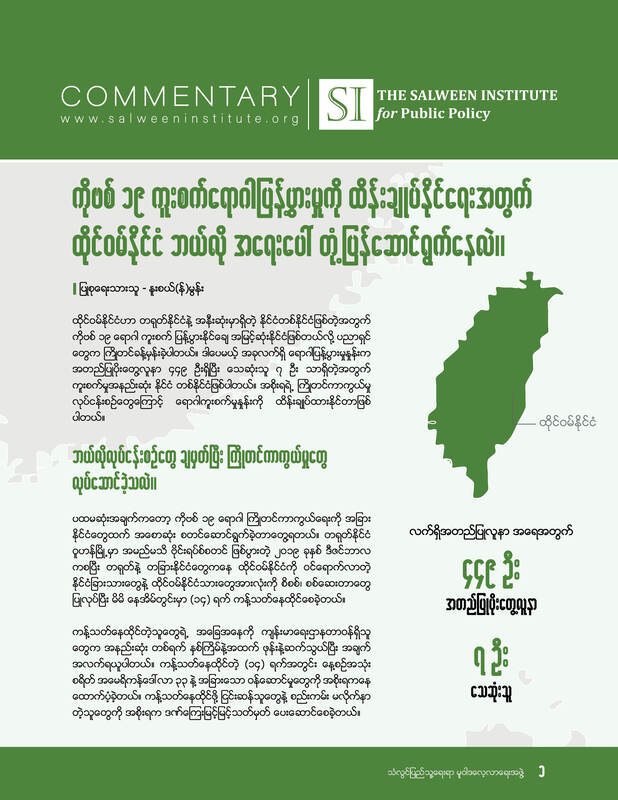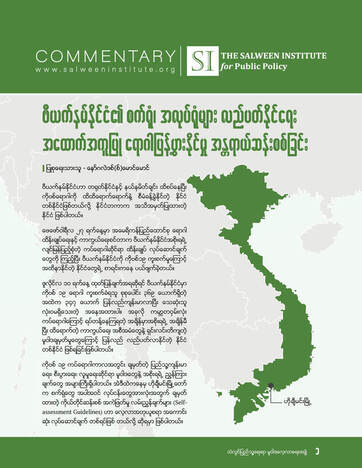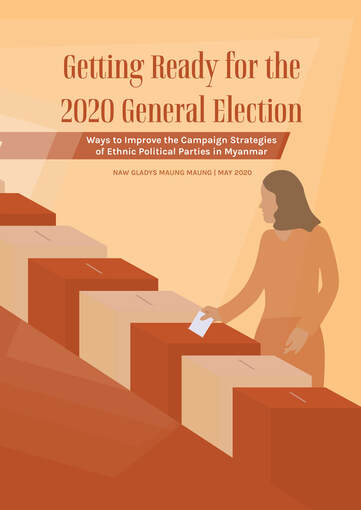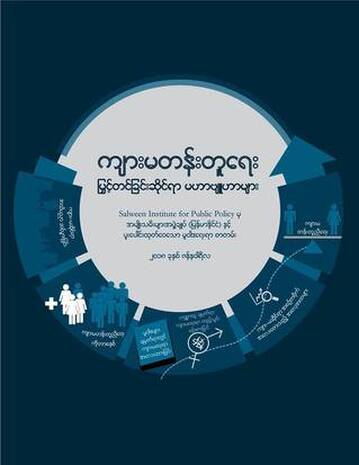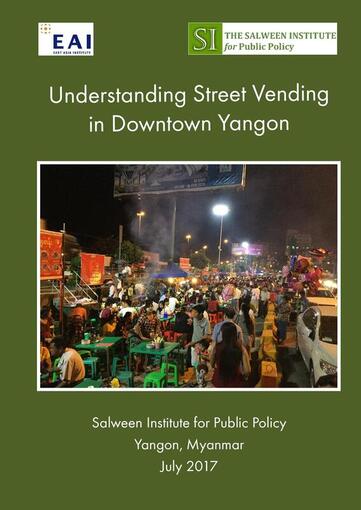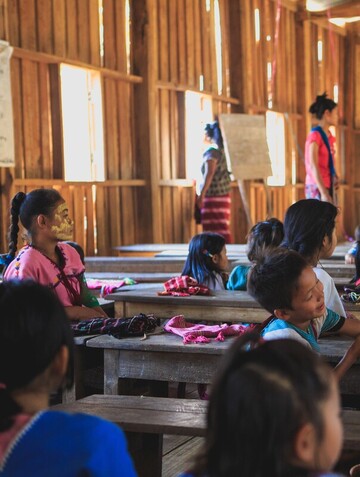The Salween Institute blends objective analysis and hands-on community empowerment programs to frame policy debate and help shape public policy in Burma/Myanmar based on social justice, environmental responsibilities and ethnic right to self-determination.
NEW PUBLICATION
အနာဂတ်ဖက်ဒရယ်ဒီမိုကရေစီပြည်ထောင်စုနှင့် ဒေသန္တရ ကိုယ်ပိုင်အစိုးရများလက်ရှိ ဖက်ဒရယ်ပြည်ထောင်စုနှင့် ပြည်နယ်အသီးသီးတို့၏ ဖွဲ့စည်းပုံအခြေခံဥပဒေမူကြမ်း ရေးဆွဲရေး ဖြစ်စဉ် များမှတဆင့် ဒေသန္တရအစိုးရများကို ဥပဒေကြောင်းအရ ဖွဲ့စည်းတည်ထောင်နိုင်သည့် အခွင့်အလမ်းများ ဖြစ်ပေါ် လာသည်။
ဤစာတမ်းတွင် ကမ္ဘာတစ်ဝန်းရှိ ဖက်ဒရယ်နိုင်ငံအများအပြားတွင် ကျင့်သုံးလျက်ရှိသည့် ဒေသန္တရကိုယ်ပိုင် အစိုးရဟူသော အယူအဆနှင့် ဒေသန္တရကိုယ်ပိုင် အစိုးရတစ်ရပ်တွင် မရှိမဖြစ် လိုအပ်သော အစီအမံများကို မိတ်ဆက်တင်ပြထားပါသည်။ ထို့အပြင် ဖက်ဒရယ်စနစ်ကျင့်သုံးသည့် နိုင်ငံများ (ကနေဒါ၊ ဆွစ်ဇာလန်၊ အိန္ဒိယ နှင့် နီပေါ) တို့၏ ဒေသန္တရကိုယ်ပိုင် အစိုးရအကြောင်းကို နှိုင်းယှဉ်ဆန်းစစ်ထားပါသည်။ ထို့နောက် မြန်မာနိုင်ငံ၏ လက်ရှိ ဒေသန္တရအုပ်ချုပ်ရေးစနစ်ကို ဆန်းစစ်ကာ အနာဂတ် ဒေသန္တရကိုယ်ပိုင် အစိုးရ စနစ်ဖော်ဆောင်နိုင်ရန် မဖြစ်မနေ ပြောင်းလဲရမည့် အချက် အလက်များကို ထုတ်ဖော်ညွှန်းဆိုထားပါသည်။ နောက်ဆုံးအပိုင်းတွင်မူ (၁) ရိုးရှင်းသော ဗဟိုချုပ်ကိုင်မှုလျော့ချခြင်းနည်းလမ်းမှ တဆင့်ရယူသည့်ပုံစံနှင့် (၂) စစ်မှန်သော ဖက်ဒရယ်စနစ်ဖြင့် ချဉ်းကပ်ရယူသည့်ပုံစံဟူ၍ ဖြစ်နိုင်ချေ ဒေသန္တရကိုယ်ပိုင် အစိုးရ ပုံစံ နှစ်ရပ်ကို တင်ပြထားပါသည်။ အနာဂတ်ဖက်ဒရယ်ဒီမိုကရေစီပြည်ထောင်စုတွင် ဒေသန္တရကိုယ်ပိုင် အစိုးရများ ပေါ်ပေါက် လာနိုင်စေရန် အထောက်အကူဖြစ်စေနိုင်မည်ဟု မျှော်လင့်ပါသည်။ Download PDF in English Download PDF in Burmese RELEASED: June 21, 2022 |
Local Self-government in the future Federal Democratic Union: Creation of the States, Partners of the UnionThe current political discourse opens up a possibility for local governments to be legally established through the federal constitution and respective state constitution drafting processes.
The paper first introduces the concept of local self-government, which is commonly practiced in federal countries around the world and presents the necessary arrangements for a local self-government system. Then, the paper studies the local self-government systems of four federal countries (Canada, Switzerland, India, and Nepal) through a comparative analysis of their practices and principles. The paper, then, analyzes the present local administration system of Burma and highlights the characteristics that need to be changed in the future local self-government system. Finally, the paper recommends the structure of two possible local self-government systems: one that would emerge through simple decentralization and the other through true federalism. We hope this paper will serve as a valuable resource for the emergence of a local self-government system in the future Federal Democratic Union of Burma. Download PDF in English Download PDF in Burmese RELEASED: June 21, 2022 |
Proportional Representation: Why Now is Not the Right Time
Thus, this commentary aims to understand the potential effects of adopting different electoral systems through empirical analysis to figure out which electoral system would be relevant for future federal democratic Burma. Download PDF in English Download PDF in Burmese RELEASED: January 20, 2022 |
ဘာကြောင့် အချိုးကျ ကိုယ်စားပြုစနစ်ကျင့်သုံးဖို့ အချိန်မှန် အခါမှန် မဟုတ်သလဲ။
Download PDF in Burmese Download PDF in English RELEASED: January 20, 2022 |
Burma’s Electoral System Change and Proportional Representation
In an effort to change Burma’s electoral system from first-past-the-post (FPTP) to proportional representation (PR), the current coup council has been holding a series of meetings with several political parties Certainly, the military is trying to create a system that effectively serves their interest despite its apparent lack of legitimacy. While it is important to reject an electoral system designed by such an illegitimate institution, it is equally as important to have a proper answer to the question, “What kind of electoral system do we want if not the PR that the military describes?” For a country as diverse and conflict-prone as Burma, adopting an electoral system requires a careful approach. Aiming to contribute to the ongoing discussion around choosing an appropriate electoral system for the future federal democratic union, we present our analysis of the possible approaches taken by the military as well as risks and opportunities of PR in the context of Burma.
Download PDF in English Download PDF in Burmese RELEASED: December 28, 2021 |
မြန်မာနိုင်ငံ၏ ရွေးကောက်ပွဲစနစ် အပြောင်းအလဲ နှင့်
|
Establishing a Federal Army: Fantasy Versus RealityEstablishing a federal army that holds its ground in integration and equality is a crucial consideration not only for the defense architecture of the future federal Union but also for the revolution against the current dictatorship and conflict resolution. Worthy questions including “Why do we need a genuine federal army?”, “In what ways are we going to build unity?” and “What are the necessary steps to be taken?” are addressed in this commentary. We welcome and look forward to reading your thoughts, feedbacks, and comments with us here or in private.
Download PDF in English RELEASED: October 28, 2021 |
ဖက်ဒရယ်တပ်မတော်ထူထောင်ရေး စိတ်ကူးနှင့် လက်တွေ့စည်းလုံးညီညွှတ်မှုရှိပြီး တန်းတူရေးကို အခြေခံတဲ့ ပြည်ထောင်စုတပ်မတော်တစ်ခု ပေါ်ပေါက်ရေးဟာ အနာဂတ် ပြည်ထောင်စုကာကွယ်ရေး ဗိသုကာအတွက်သာမက၊ လက်ရှိအာဏာရှင်စနစ်ကို တော်လှန်ရေးနဲ့ ပဋိပက္ခ ချုပ်ငြိမ်းရေးတို့အတွက်ပါ လိုအပ်တဲ့စဉ်းစားချက်ဖြစ်ပါတယ်။ စစ်မှန်တဲ့ ပြည်ထောင်စု တပ်မတော် ဘာကြောင့် လိုအပ်လဲ၊ ဘယ်လိုနည်းလမ်းတွေနဲ့ စည်းလုံးညီညွှတ်မှုကိုတည်ဆောက်နိုင်မလဲ၊ ဖြတ်သန်းရမယ့် အဆင့်တွေဟာ ဘာတွေဖြစ်မလဲ စတာတွေကို ဒီစာတမ်းငယ်မှာ ဆွေးနွေးထားပါတယ်။ စာဖတ်သူတွေအနေနဲ့လည်း အပြန်အလှန် အမြင်ဖလှယ်ကြဖို့ ဆွေးနွေးကြဖို့လည်း ဖိတ်ခေါ်လိုပါတယ်။
Read in Burmese RELEASED: September 20, 2021 |
နိုင်ငံရေးအခင်းအကျင်းနှင့် အင်အားစုများကို ပြန်လည်သုံးသပ်ခြင်း
၂၀၂၀ ခုနှစ် အထွေထွေရွေးကောက်ပွဲလဲ ပြီးသွားပါပြီ။ ၂၀၁၀ ခုနှစ်မှာ တစ်ကြိမ်၊ ၂၀၁၅ ခုနှစ်မှာ တစ်ကြိမ်၊ အခု ၂၀၂၀ ခုနှစ်မှာ တကြိမ်ဆိုပြီး အထွေထွေရွေးကောက်ပွဲ ကျင်းပလာတာ ၃ ကြိမ် ရှိခဲ့ပါပြီး။ လွှတ်တော် သက်တမ်း ၂ ကြိမ် ပြီးဆုံးခဲ့ပါပြီး။ ၂၀၁၀-၂၀၁၅ သက်တမ်း၊ ၂၀၁၅-၂၀၂၀ သက်တမ်းတို့ရဲ့ ပြောင်းလဲလာတဲ့ အင်အားစုတွေအကြောင်း၊ အခြေအနေ၊ အခင်းအကျင်းတွေအကြောင်းတွေကို ဒီဆောင်းပါးတိုထဲမှာ နှိုင်းယှဉ် သုံးသပ်ထားပါတယ်။ အဲ့ဒီအပြင် ၂၀၂၀-၂၀၂၅ ခုနှစ် သက်တမ်းအတွင်းမှာ နိုင်ငံရေး အင်အားစုတွေ ဘယ်လို ပြောင်းလဲလာနိုင်မလဲ၊ ဘယ်လို အခင်းအကျင်းတွေနဲ့ ပြောင်းလဲမှုတွေ ဆက်ဖြစ်လာနိုင်မလဲဆိုတာကိုလဲ မှန်းဆကြည့်နိုင်ဖို့ ထည့်သွင်း သုံးသပ်ဖော်ပြထားပါတယ်။
Read in Burmese (Download the PDF) RELEASED: November 18, 2020 |
လမ်းဆုံလမ်းခွက ရွေးကောက်ပွဲစနစ်
လက်ရှိ ကျင့်သုံးနေတဲ့ ရွေးကောက်ပွဲစနစ်ဖြစ်တဲ့ တစ်မဲသာ အနို်င်ရတဲ့ စနစ် FPTP နဲ့ အချိုးကျ ကိုယ်စားပြုစနစ် PR တို့ရဲ့ သက်ရောက်မှုတွေကို ၂၀၁၅ ခုနှစ် အထွေထွေရွေးကောက်ပွဲရဲ့ ရလဒ် တွေကို အခြေခံပြီး လေ့လာသုံးသပ်ထားတဲ့ စာတမ်းဖြစ်ပါတယ်။ စုံလင်ကွဲပြားလှတဲ့ လူမှု အသိုင်းအဝိုင်းတွေအတွက် ဘယ်စနစ်က ပိိုမို မျှတ၊ ပိုမိုကောင်းမွန်တဲ့ ကိုယ်စားပြုမှုတွေကို ဖော်ဆောင်ပေးနိုင်မလဲဆိုတာ ဖော်ပြနိုင်ဖို့ ရည်ရွယ်တဲ့ စာတမ်း ဖြစ်ပါတယ်။ အန္တိမပန်းတိုင် ကတော့ မျှတမှုရှိတဲ့ ရွေးကောက်ပွဲရလဒ်တွေကနေတဆင့် ကိုယ်စားပြု ဒီမိုကရေစီစနစ် ပိုမိုတောင့်တင်းခိုင်မာလာစေဖို့အတွက် ဖြစ်ပါတယ်။
ပိုမိုကောင်းမွန်တဲ့ ကိုယ်စားပြုမှုရှိမှ ပိုမိုပြီး စုံလင်ကွဲပြားတဲ့ လွှွတ်တော်ဖြစ်မှာပါ။ ပိုမိုပြီး စုံလင်ကွဲပြားတဲ့ လွှတ်တော်ဖြစ်မှ အားလုံးပါဝင်မှုရှိတဲ့ အင်စတီဂျူးရှင်းတွေနဲ့ စုပေါင်း ဆုံးဖြတ်ချက် ချမှတ်ခြင်းတွေ ဖော်ဆောင် နိုင်မှာ ဖြစ်ပါတယ်။ ဒါတွေအားလုံးဟာ ပိုမို တောင့်တင်းခိုင်မာတဲ့ ဒီမိုကရေစီစနစ်အတွက်သာမကဘဲ တိုင်းရင်းသားတန်းတူရေးနှင့် ပြန်လည် သင့်မြတ်ရေးအတွက်လဲ အထောက်အကူပြုနိုင်မဲ့ ခြေလှမ်းတွေဖြစ်ပါတယ်။ Read in Burmese (Download the PDF) RELEASED: November 6, 2020 |
တိုင်းရင်းသားနိုင်ငံရေးပါတီများနှင့် ၂၀၂၀ ရွေးကောက်ပွဲ
"တိုင်းရင်းသားပါတီတွေကို မဲပေးခြင်းဖြင့် အခွင့်အရေးပိုရလာမယ်ဆိုတာ မဟုတ်ဘူး။ ...... ဒါကြောင့် တိုင်းရင်းသားတွေအနေနဲ့ NLD လက်အောက်ကနေ အခွင့်အရေးတွေ ရနိုင်တယ်ဆိုတာ နားလည်ဖို့လိုတယ်။"
"... ဘယ်တိုင်းရင်းသားနဲ့မှ အဟာမိတ်ဖွဲ့စရာမလိုဘူး၊ NLD တစ်ခုထဲနဲ့ အစိုးရပြန်ဖွဲ့နိုင်အောင်ပဲ ကြိုးစားသွားမယ်" လက်ရှိ အနိုင်ရပါတီ၊ ခု လာမယ့် ၂၀၂၀ ရွေးကောက်ပွဲမှာလဲ ထောက်ခံမှုအားကောင်းနေဆဲ ပါတီရဲ့ ခေါင်းဆောင်က ပြောသွားတဲ့ စကားတွေပါ။ ကိုုယ့်အမျိုးသား တန်းတူရေးပန်းတိုင်ဆီကို နည်းလမ်းမျိုးစုံနဲ့ သမိုင်းတစ်လျှောက် အစဉ်တစိုက် ခရီးဆက်လာခဲ့ကြတဲ့သူတွေကို ရွေးကောက်ပွဲတစ်ပွဲထဲနဲ့ စိန်ခေါ်လိုက်တာ ဖြစ်ပါတယ်။ အပြောခံရဖို့သက်သက်နဲ့ ဒီခရီးကို ဆက်ခဲ့ကြတာလားဆိုတာ တိုင်းရင်းသားပါတီတွေအနေနဲ့ရော၊ တိုင်းရင်းသားပြည်သူလူထုတစ်ရပ်လုံးအနေနဲ့ရော ပြန်လည်သုံးသပ်တဲ့နေရာမှာ အထောက်အကူဖြစ်စေဖို့အတွက် ရှုထောင့်ပေါင်းစုံက သုံးသပ်ထားတဲ့ ဆောင်းပါးဖြစ်ပါတယ်။ PDF ဖိုင် ဒေါင်းလုပ်ရန် RELEASED: October 21, 2020 |
Electoral System at a Crossroads
This paper examined the effect of the current first-past-the-post (FPTP) electoral system as compared to a potential proportional representation (PR) electoral system on the level of representation using the election result from the 2015 general election. The paper aims to demonstrate which electoral system would be fairer and create a better representation for diverse communities. Ultimately, the goal is to strengthen representative democracy through fair election results.
In short, a better representation is a more diverse parliament. A more diverse parliament is a more inclusive institution, and collective decision making which are all a step towards not only a stronger democracy, but also a possibility of social cohesion and national reconciliation. Read in English (Download the PDF) RELEASED: October 14, 2020 |
|
ဒီမိုကေရစီအသွင်ကူးပြောင်းရေးနှင့်လျော်ညီသော ပြောင်းလဲမှုမျိုးသည်သာ NLD အတွက် အဓိကဦးစားပေးဖြစ်နေပြီး တိုင်းရင်းသားတွေရဲ့ ကိုယ်ပိုင်ပြဋ္ဌာန်းခွင့်နဲ့ ဆက်စပ်တဲ့ ရပ်တည်ချက်ဟာ ပြတ်သားမှုရှိမနေဘူးဆိုတာကို လက်ရှိအာဏာရ အစိုးရရဲ့ လုပ်ရပ်တွေအပြင် ယခုတရားဝင်ထုတ်ပြန်ထားတဲ့ ရွေးကောက်ပွဲကြေညာစာတမ်းပါ ကတိကဝတ်တွေကို လေ့လာကြည့်ခြင်းဖြင့်ပါ သိနိုင်ပါတယ်။ တိုင်းရင်းသားပြည်သူတွေအနေနဲ့ ၂၀၂၀ ရွေးကောက်ပွဲမှာလည်း NLD ကိုပဲ ဆက်လက်အားကိုးဖို့အတွက် လုံလောက်တဲ့ အကြောင်းရင်းရှိသလားဆိုတာကို ဒီစာတမ်းထဲမှာ နှိုင်းယှဉ်သုံးသပ်ထားပါတယ်။
Read in Burmese (Download the PDF) RELEASED: September 30, 2020 |
|
အပစ်အခတ်ရပ်စဲရေးပုံစံအမျိုးမျိုး၊ အဲ့ဒီ ပုံစံအမျိုးမျိုးရဲ့ အကောင်အထည်ဖော်မှုအဆင့်တွေကို အခြေခံတဲ့ အသွင်ကူးပြောင်းမှုဆိုင်ရာ စွန့်စားမှုတွေက ဘာတွေလဲ၊ အဲဒီစွန့်စားမှုတို့ ဘယ်လို ပုံစံနဲ့ စီမံနိုင်မလဲ၊ လက်ရှိငြိမ်းချမ်းရေး ဖြစ်စဉ် ပိုမို ထိရောက်အောင်မြင်စေဖို့ ဘယ်လိုပုံစံမျိုးနဲ့ လုပ်ဆောင်နိုင်မလဲဆိုတာတွေကို သုံးသပ်ထားတဲ့ ဆောင်းပါးဖြစ်ပါတယ်။
လက်ရှိငြိမ်းချမ်းရေးဖြစ်စဉ်ဟာ အပစ်အခတ်ရပ်စဲရေး သေဘာတူစာချုပ်ကတစ်ဆင့် အသွင် ကူးပြောင်းမှုဆိုင်ရာ စွန့်စားမှုတွေနဲ့ ရင်ဆိုင်နေရပြီး အဲဒီစွန့်စားမှုတွေဟာ အခွင့်အလမ်းတွေ၊ ဆုံးရှုံးနိုင်ချေတွေနဲ့ ရောလျှက်နေပါတယ်။ အခွင့်အလမ်းတွေကို အမိအရယူနိုင်မှဘဲ လက်ရှိ အပစ်အခတ်ရပ်စဲရေး သဘောတူထားတဲ့ နိုင်ငံရေးအင်အားစုတွေကြားမှာဖြစ်ဖြစ်၊ မပါဝင်လာ သေးတဲ့ အဖွဲ့တွေမှာဘဲဖြစ်ဖြစ် ယုံံကြည်မှုတွေ အမှန်တည်ဆောက်နိုင်ပြီး ရေရှည်တည့်တံတဲ့ အပစ်ခတ်ရပ်စဲရေး၊ ဖက်ဒရယ်ဒီမိုကရေစီ နိုင်ငံ တည်ဆောက်ရေးနဲ့ ငြိမ်းချမ်းရေးစတဲ့ အသွင် ကူးပြောင်းမှု ဖြစ်စဉ်တွေကို တဆင့်ချင်းစီ တက်လှမ်းနိုင်မှာ ဖြစ်ပါတယ်။ Read in Burmese (Download the PDF) RELEASED: September 7, 2020 |
ပိုမိုကောင်းမွန်သော ဖက်ဒရယ် ဒီမိုကရက်တစ် ပြည်ထောင်စုဆီသို့၁။ လုံခြုံရေးကဏ္ဍပြုပြင်ပြောင်းလဲဖို့ ဘယ်လို စိန်ခေါ်မှုတွေနဲ့ ရင်ဆိုင်နေရ လဲ။ ဘာကြောင့် ပြုပြင်ပြောင်းလဲဖို့ လိုအပ်တာလဲ။
၂။ တိုင်းပြည်ရဲ့ လုံခြုံရေးအတွက် စဉ်းစားတဲ့နေရာ အထောက်အကူဖြစ်စေ မယ့် အခြေခံမူတွေကဘာလဲ။ ၃။ ကမ္ဘာတစ်ဝှမ်းက ဖက်ဒရယ်ဒီမိုကရေစီနိုင်ငံတွေ လုံခြုံရေးကဏ္ဍနဲ့ စပ်လျဉ်းပြီး ဘယ်လို ချဉ်းကပ် ဆောင်ရွက်ကြသလဲ။ စည်းလုံးညီညွှတ်မှု၊ အချုပ်အခြာအာဏာ၊ ဒီမိုကနေစီနဲ့ ဖက်ဒရယ်ဝါဒတွေ ခိုင်မာအားကောင်းစေဖို့၊ မြန်မာနိုင်ငံရဲ့ အကူးအပြောင်းကာလမှာ အဓိက ကျတဲ့ လုံခြုံရေးကဏ္ဍကို ဖက်ဒရယ်နဲ့ ဒီမိုကရေစီစံနှုန်းတွေကို အခြေခံပြီး သုံးသပ်ထားတဲ့ စာတမ်းဖြစ်ပါတယ်။ မြန်မာဘာသာဖြင့် ဖတ်ရန် အင်္ဂလိပ်ဘာသာဖြင့် ဖတ်ရန် RELEASED: August 8, 2020 |
|
Envision a Security Sector Reform: Toward a better federal democratic union
What are the challenges of the current security sector and why does it need a reform?
This paper explored and examined the aforementioned questions with an intention to assist the process for security sector reform based on key federal and democratic principles in order to consolidate unity, sovereignty, democracy and federalism in the future. Read in Burmese Read in English RELEASED: August 8, 2020 |
|
“တိုင်းရင်းသားနိုင်ငံရေးပါတီများသည် မူဝါဒများမပါရှိဘဲ လူမျိုးဆိုင်ရာ ဆွဲဆောင်မှု သက်သက်ဖြင့် ရွေးကောက်ပွဲတွင် အနိုင်ရနိုင်ရန် မလုံလောက်တော့ကြောင်း ကမ္ဘာတစ်ဝန်းမှ တိုင်းရင်းသား နိုင်ငံရေး ပါတီများ၏ ဥပမာများက ပြသနေသည်။ အကြောင်းမှာ မဲဆန္ဒရှင်များ သည် လူမျိုးဆိုင်ရာ ဆွဲဆောင်မှုထက် ၄င်းတို့၏ နေ့စဉ် ဘဝအပေါ် သက်ရောက်မှုရှိသည့် မူဝါဒဆိုင်ရာ ကတိကဝတ်များကို ပိုမိုအားရုံစိုက် အလေးထားလာကြသောကြောင့် ဖြစ်သည်။ ” (စာမျက်နှာ ၈)
ဒီမိုကရေစီစနစ် ပိုမိုခိုင်မာအားကောင်းလာစေရန် လှုပ်ရှားဆောင်ရွက်နေကြသည့် တိုင်းရင်းသားနိုင်ငံရေးပါတီများနှင့် အရပ်ဘက် အဖွဲ့အစည်းများအတွက် ရည်ရွယ်၍ သံလွင်ပြည်သူ့ရေးရာ မူဝါဒ လေ့လာရေးအဖွဲ့မှာ ဤစာတမ်းကို ရေးသားပြုစုထားပါသည်။ ျမြန်မာဘာသာဖြင့် ဖတ်ရှုရန် PDF ဖိုင်ကို ဤနေရာတွင် ရယူနိုင်ပါသည်။ English RELEASED: July 29, 2020 |
|
How did Korea respond to the COVID-19 crisis?
This week, we looked at how the Republic of Korea has responded to Covid-19 Pandemic. This commentary by Shine Ko Ko Lwin discussed the effectiveness of legislative, executive and administrative responses of the Government of Korea. It also discussed how the citizen of Korea and civil society organizations collaborated and cooperated with their government. Read in Burmese (Download the PDF) RELEASED: July 18, 2020 |
|
How did Taiwan handle the COVID-19 crisis?
This latest commentary by Nu Tsen Mun sheds some important lights on Taiwan's successful efforts to control the spread of COVID-19 and potential lesson Myanmar can learn from its experience. The most notable thing was that important of long-term, systematic, data collection discussed in section two of the commentary. Read in Burmese (Download the PDF) RELEASED: July 14, 2020 |
|
How did Vietnam handle the COVID-19 crisis? Please see the latest commentary by Naw Gladys Maung Maung of Salween Institute for Public Policy on this very important topic. The commentary sheds some important lights on Vietnam's strength and weaknesses in its efforts to control the spread of COVID-19 in the country. Read in Burmese. . . (Download the PDF) RELEASED: July 10, 2020 |
“Pure appeals to ethnicity without policies are becoming increasingly inadequate for ethnic political parties to win elections because voters are responding less to the appeals to ethnicity and more to the policy promises that affect their day-to-day lives.” (Page 8)
Intending to reach ethnic political parties and CSOs that are assisting the process of strengthening democracy in Myanmar, the Salween Institute of Public Policy addresses these questions in our newest publication: “Getting Ready for the 2020 General Election: Ways to Improve the Campaign Strategies of Ethnic Political Parties in Myanmar”. Read in Burmese (Download the PDF) Read in English (Download the PDF) RELEASED: July 2, 2020 |
|
Strategies to Promote Gender Equality
A policy paper by the Salween Institute for Public Policy in partnership with the Women's League of Burma This paper has been written in order to support efforts to increase women’s participation in negotiations for a cease-fire agreement, political negotiations, and legislative and administrative processes. We hope to promote gender equality through more women’s participation in the political decision-making process, starting with raising awareness about gender. Read more... (Download the PDF) RELEASED: January 2018 |
|
Understanding Street Vending in Downtown Yangon
A Policy Paper by the Salween Institute for Public Policy This paper explores the socioeconomic life of Yangon street vendors, as well as problems caused by those street vendors. Simultaneously, this paper examines the new policies on street vendors of Yangon regional government as well as how they are carrying out the policy changes, and explores the impact of those policy changes. In addition, the future plans and designs of the regional government for vending businesses are also included in this paper as a topic of urban planning for the future. Read in English or Burmese (Download the PDF) RELEASED: July 2017 |
|
Prospects for Peace: Challenges and Opportunities for the Myanmar Peace Process
By Tabea Campbell Pauli It has been over half a year now since the democratic transfer of leadership to Aung San Suu Kyi’s NLD government, giving citizens, stakeholders and onlookers an idea of the direction and progress of peacebuilding in Myanmar. Recent resurgences of conflict in several ethnic states, as well as accusations of violence against civilians by the Tatmadaw (Myanmar’s military), have been taken as a test of will and ability of the government to confront these issues and hold military forces accountable to the nation’s laws and constitution. Read in English (Download the PDF) RELEASED: December 2016 |

